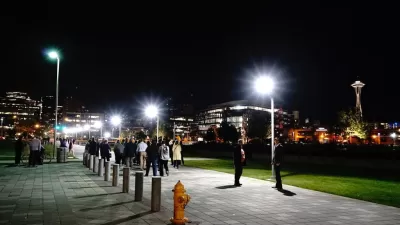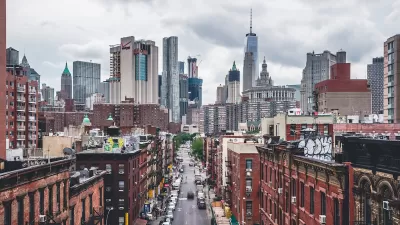As the presidential election season gears up, Mortimer B. Zuckerman's op-ed offers a cynical and weary electorate hope by invoking a transformative political vision of the role of the city.
For those unfamiliar with Bruce Katz and Jennifer Bradley’s 2013 book, The Metropolitan Revolution, the Editor-in-Chief of U.S. News & World Report offers a renewed rally cry.
"Leading metropolitan areas are more or less on their own since the federal government is in deep freeze," Mortimer B. Zuckerman states. He zeros in on partisan gridlock in Washington to explain why cities are assuming leadership in areas that were once the purview of the federal government, building the infrastructure and welcoming the communities that create the innovation clusters that drive 21st century economic development.
"Similar to the Tea Party and the Occupy movements, the metropolitan revolution is a child of the Great Recession," Katz and Bradley write. "Yet it is reasoned rather than emotional, leader driven rather than leaderless, born of pragmatism and optimism rather than despair and anger."
Unlike far-removed Washington politicians focused on two-year election cycles, city leaders plan for the long haul and "live daily with the consequences of their decisions," writes Zuckerman.
"The metropolitan revolution has only one logical conclusion: the inversion of the hierarchy of power in the United States," predict Katz and Bradley. They go so far as to write, "There is, in essence, no American (or Chinese or German or Brazilian) economy; rather, a national economy is a network of metropolitan economies."
While this outcome may seem alarmingly pre-Westphalian, the Brookings Institution authors point out that such a turn honors the ingenious nature of our political system.
"But what is happening in the United States today is also rooted in timeless and quintessential American values and is uniquely aligned with the disruptive nature of this young century and the manner and places in which people live their lives. The emerging revolution is not just a cyclical reaction but also a structural shift."
FULL STORY: The New American Heartland

Planetizen Federal Action Tracker
A weekly monitor of how Trump’s orders and actions are impacting planners and planning in America.

The Simple Legislative Tool Transforming Vacant Downtowns
In California, Michigan and Georgia, an easy win is bringing dollars — and delight — back to city centers.

San Francisco's School District Spent $105M To Build Affordable Housing for Teachers — And That's Just the Beginning
SFUSD joins a growing list of school districts using their land holdings to address housing affordability challenges faced by their own employees.

In More Metros Than You’d Think, Suburbs are Now More Expensive Than the City
If you're moving to the burbs to save on square footage, data shows you should think again.

The States Losing Rural Delivery Rooms at an Alarming Pace
In some states, as few as 9% of rural hospitals still deliver babies. As a result, rising pre-term births, no adequate pre-term care and "harrowing" close calls are a growing reality.

The Small South Asian Republic Going all in on EVs
Thanks to one simple policy change less than five years ago, 65% of new cars in this Himalayan country are now electric.
Urban Design for Planners 1: Software Tools
This six-course series explores essential urban design concepts using open source software and equips planners with the tools they need to participate fully in the urban design process.
Planning for Universal Design
Learn the tools for implementing Universal Design in planning regulations.
Smith Gee Studio
City of Charlotte
City of Camden Redevelopment Agency
City of Astoria
Transportation Research & Education Center (TREC) at Portland State University
US High Speed Rail Association
City of Camden Redevelopment Agency
Municipality of Princeton (NJ)





























